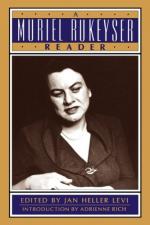|
This section contains 3,499 words (approx. 12 pages at 300 words per page) |

|
SOURCE: "Finding Her Voice: Muriel Rukeyser's Poetic Development," in Modern Poetry Studies, Vol. XI, Nos. 1 and 2, 1982, pp. 127–38.
In the following essay, Barber traces the development of Rukeyser's poetic voice.
The early poems of Muriel Rukeyser are often flawed in ways which diminish their impact. In these poems, written from the 1930's to the mid-fifties, the poet tends to speak in a transcendental language which on analysis may seem merely vague. At the same time, Rukeyser's goals and values are stated or implied so incessantly that one's response to the poetry may depend greatly on how one reacts to the poet's relentless identification with causes and principles. Frequently in these poems, assuming the role of representative of humanity, Rukeyser orates and preaches. [In Poetry and the Age, 1953] Randall Jarrell "with dismay and delight" sensed her to be "the Common Woman of our century," and William H. Pritchard [in the...
|
This section contains 3,499 words (approx. 12 pages at 300 words per page) |

|


